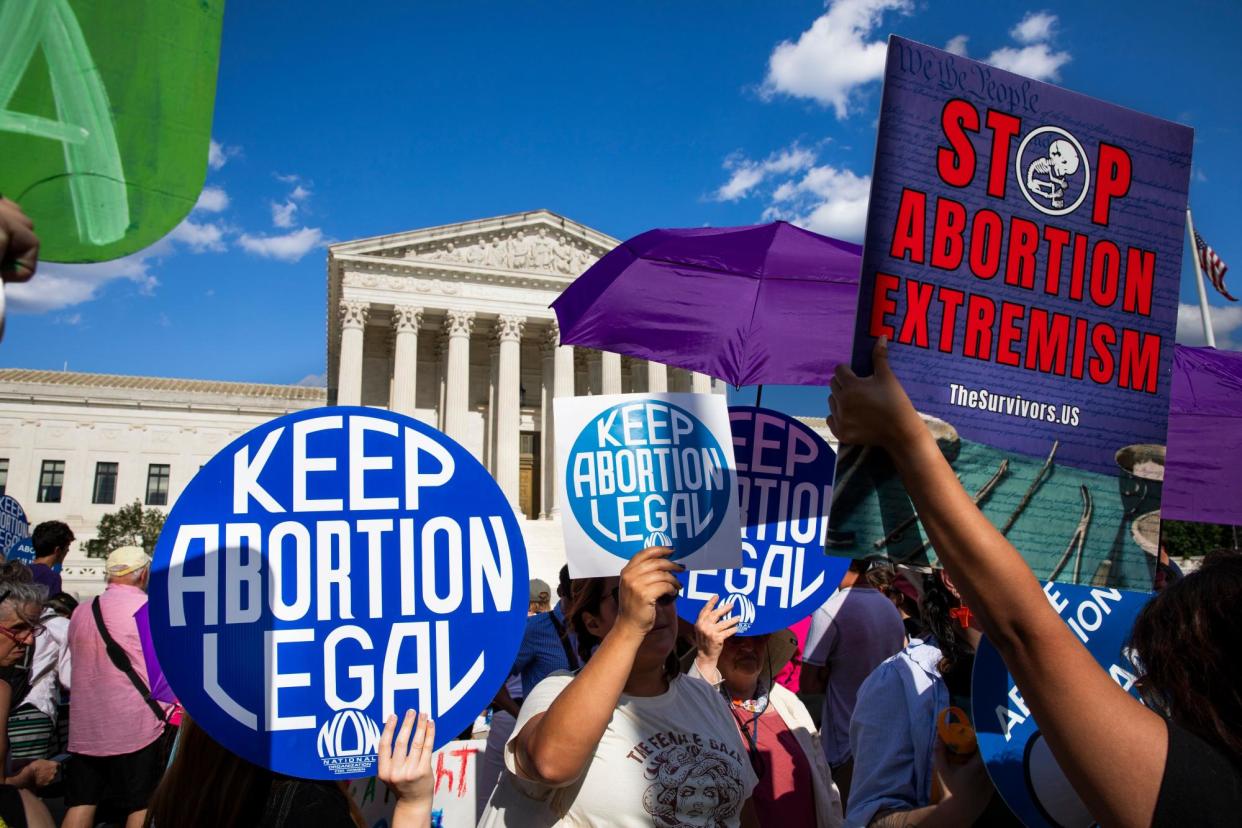Republicans omit national abortion ban from platform for first time in 40 years

The Republican party has omitted a national abortion ban from its official party platform for the first time in 40 years, opting instead to focus on the power of states to regulate abortion in a move that reflects Donald Trump’s preferred position.
Fourteen states have adopted near-total abortion bans since the supreme court overturned Roe v Wade in 2022, ending the federal constitutional right to obtain an abortion.
The party’s new policy platform is the first since Trump won the White House in 2016, and is significantly slimmer, down from 66 pages to 16. In the 2020 race, which Trump went on to lose to Joe Biden, the party did not adopt a new platform.
The document – approved within a few hours on Monday in Milwaukee, Wisconsin, where the party will hold its convention next week – includes many slogans that will be familiar to Trump supporters. On oil production, for instance, it says the president will “drill baby drill”.
The 20-point plan, written in all-capital letters, lays out an agenda that includes a pledge to “seal the border and stop the migrant invasion”, as well as continue building a border wall that Trump promised during his presidency but largely failed to deliver. It also promises to “end inflation and make America great again”, to enact tax cuts for workers with “no tax on tips” and to make college campuses “safe” by deporting so-called “pro-Hamas radicals”.
The platform repeatedly criticizes policies to empower transgender individuals, specifically their involvement in sports. It also promises to repeal emissions regulations on gas vehicles and to build an “Iron Dome”, a reference to Israel’s anti-missile defense system. It pledges to ensure “election integrity” with new voting restrictions, end “gender insanity” and support for trans inclusion policies, “stop woke” government and “protect free speech” online. Notably, Republicans also said they would “welcome” greater political participation from US territories, such as Puerto Rico and Guam.
On abortion, the policy document starts by saying that the president would support the 14th amendment, which generally provides the right to due process.
“We believe that the 14th amendment to the constitution of the United States guarantees that no person can be denied Life or Liberty without Due Process, and that the States are, therefore, free to pass Laws protecting those Rights,” it says.
Anti-abortion activists have long argued the amendment should be interpreted by courts to include fetuses in utero, thereby guaranteeing “personhood” rights. Such an interpretation would probably make many aspects of in vitro fertilization (IVF) illegal, similar to how Alabama’s supreme court threw IVF into turmoil this spring.
The document continues: “After 51 years, because of us, that power [to regulate abortion] has been given to the States and to a vote of the People.”
It adds that Republicans would oppose “late term abortion” – a non-medical term used in the political sphere to generally mean abortion past 20 weeks’ gestation – and that the party would support “mothers and policies that advance prenatal care, access to birth control, and IVF”.
The aspirations of those who helped craft the president’s platform on abortion are significantly more radical than what the policy document lays out.
Kristi Hamrick, a representative of Students for Life who told Catholic News Agency (CNA) she has been working with the Trump campaign, said activists are already considering how a prospective second Trump administration could advance these goals.
“If we de-tangled and cut out the cancer of abortion and abortion-related programming from our federal budgets, we can have a healthier budget and a life-affirming budget,” Hamrick told CNA. That work would, in Hamrick’s words, constitute “a very vibrant and vigorous term”, for anti-abortion activists.
In communications to the broader public, anti-abortion activists have generally leaned toward more ambiguous language about their goals. Popular support for abortion rights has risen since the supreme court overturned Roe v Wade.
A national poll released this week by the Associated Press-Norc Center for Public Affairs Research finds a solid majority of Americans oppose a national abortion ban, and a rising number support the procedure for any reason.
Democrats responded to the new Republican platform by pointing out that the architects of the 20-point plan were also connected to the controversial Project 2025, a plan Trump has publicly disavowed but shares a joint vision with the president’s statements.
“Trump is so desperate to distance himself from Project 2025 as the American people are grappling with the terrifying truth about his second-term agenda that he and his team overhauled the Republican platform process to keep the public and the press in the dark, all caps-ed 20 bullet points behind closed doors, and blasted it out to divert attention from his real plans,” said the Democratic National Committee press secretary, Emilia Rowland.
Rowland continued: “The American people know that Trump wants a nationwide abortion ban and they know the only thing standing in the way of Trump’s terrifying second term agenda is re-electing President Biden and Vice-President [Kamala] Harris in November.”
